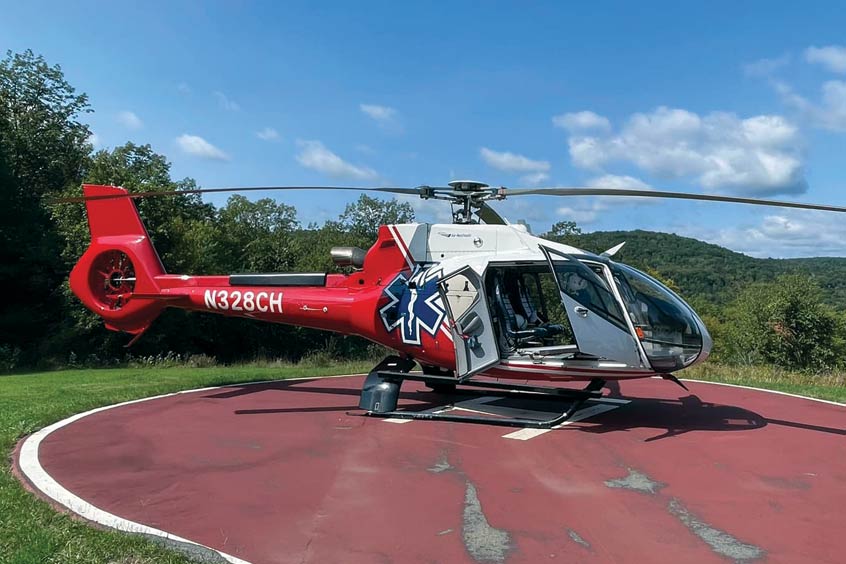 The monthly news publication for aviation professionals.
The monthly news publication for aviation professionals.

As a trusted emergency air medical provider serving the state of New York for more than 20 years, LifeNet is expanding its critical care coverage by opening a new location in Oneida County. The opening of LifeNet 7-14, a subdivision of Air Methods, serves as a community resource providing comprehensive coverage to central New York's residents and visitors.
LifeNet 7-14 joins the existing rotary aircraft bases LifeNet 7-2, 7-8 and 7-10 in Johnstown, Sidney and Watertown, and 7-9 Potsdam's fixed wing Pilatus PC-12 service, which all respond to the Mohawk Valley and beyond. The LifeNet team provides additional support to first responders, hospital systems and non-profit emergency resources, and offers the community critical care 24/7/365, responding to emergency medical and trauma events including heart attacks and strokes, paediatric emergencies, burns and other incidents. Additionally, the team provides critical interfacility transport when patients need to move between hospitals for specialised care.
“By opening this resource, LifeNet is positioned to not only improve access to emergency services but improve response times,” says LifeNet account executive Colleen Gleeson. “With the need for additional services on already taxed EMS and healthcare systems not just in this state, but across the country, LifeNet is equipped and stands ready to support patient care and transport for the region.”
LifeNet 7-14 operates an EC130 aircraft, transporting patients to their destination quickly. The aircraft coupled with the highly skilled flight team makes all the difference in saving a life. The flight team includes a pilot, nurse and paramedic.
The LifeNet Flight team is certified and has state-of-the-art specialty care training that provides the same level of care one would receive in the hospital during air medical transport from the scene or for inner facility transports. Equipped with industry-leading equipment and medical devices, the team carries and has the ability to administer blood in flight, provide advanced airway intervention; cardiac and blood flow monitoring; ventilator management; medication administration and titration – monitoring potential side effects; and other advanced surgical procedures.
“Having access to blood for scene calls and/or in flight is such a valuable resource in our community,” said Gleeson. “With this tool, patients have the potential for better outcomes. Administration of blood, combined with rapid air transport, can truly help critically ill or injured patients who otherwise might not survive.”
Due to unpredictable weather events, LifeNet 7-14 operations will be based at its sister location in Watertown, New York, and will provide service to the Mohawk Valley Region from this location until weather conditions permit relocation to a permanent base in Oneida County.
In partnership with Pennsylvanian integrated health system WellSpan Health, Air Methods, one of the USA's largest community-based providers of air medical services, today opened a new base in Lancaster County to expand critical care coverage for residents and visitors of central and southern Pennsylvania. The new base, WellFlight Lancaster, is the second joint venture base between Air Methods and WellSpan Health.
With an already established and successful base in Gettysburg, the new WellFlight Lancaster base increases comprehensive coverage in the area by adding another air medical service to the skies to positively impact patient outcomes. The new base location aims to improve access to emergency services centred on transporting sick patients as well as scene and trauma-related calls within surrounding communities, assisting fire and emergency medical service (EMS) teams and quickening response times.
“We're thrilled to continue the partnership with Air Methods and expand critical care access to the communities we serve,” says Dr. Michael Seim, senior vice president and chief quality officer, WellSpan Health. “By continuing the partnership, we are ensuring the best recovery possible for our patients.”
The continual investment and commitment to safety over the years of WellFlight's parent company, Air Methods has been critical in providing pre-hospital, lifesaving care. With a safety-centred service, Air Methods is in the top one per cent of all Part 135 operators (nearly 2,000 operators in the industry) to receive a letter of acknowledgment from the Federal Aviation Administration (FAA) accepting Air Methods' safety management system (SMS).
“Air Methods and the WellFlight programme are dedicated to continuous improvement of its safety operations and culture, believing that our SMS programme is essential to continuous improvement and unparalleled protections for our crews and patients,” notes Air Methods account executive Ron Brown. “We evaluate communication, operations, clinical quality and patient safety outcomes for every flight to improve and elevate our services.”
WellFlight Lancaster is a community-based service, operating 24/7/365 service coverage for the region, and is equipped with the most reliable and safe aircraft in the industry, transporting patients to their destinations quickly. The aircraft coupled with the highly skilled crew, which consists of a pilot, nurse and paramedic, makes all the difference in saving a life.
The team achieved the Commission on Accreditation of Medical Transport Systems (CAMTS) and carries the critical tools, medications and supplies needed to provide lifesaving interventions at the scene and ICU-level care while in flight. On every flight, the team carries blood and blood products (i.e. blood plasma), positively increasing patient outcomes through pre-hospital care. Additionally, the clinical team is extensively trained to provide, when needed, advanced airway intervention; cardiac (including balloon pump/Impella) and blood flow monitoring; ventilator management; medication administration and titration – monitoring potential side effects; and other advanced specialty surgical procedures.
“Where seconds make all the difference in saving a life, the highly trained air medical team is capable of lifesaving interventions at the scene and in flight,” concludes Brown. “We are incredibly versatile in what we do, fundamentally serving as a flying intensive care unit.”
The WellFlight team is co-housed with Stevens Fire Company, a volunteer-driven and non-profit community organisation. The alliance with the fire department provides for improved and comprehensive care between partners.
“By training with our local fire and EMS partners and being part of the community, we're producing more efficient and effective response times, arriving faster on the scene and following accurate and safe procedures, leading to seamless patient care,” said Brown. “We couldn't be prouder of the partnership we are building with our fire and EMS teams.”